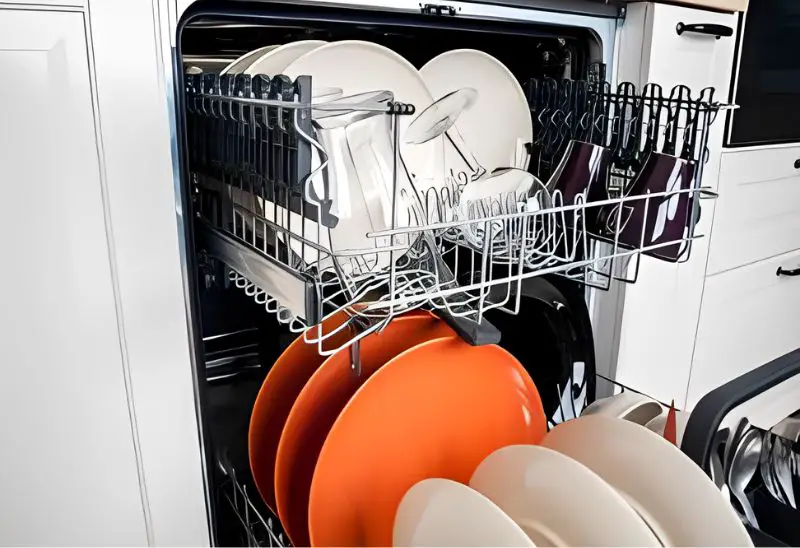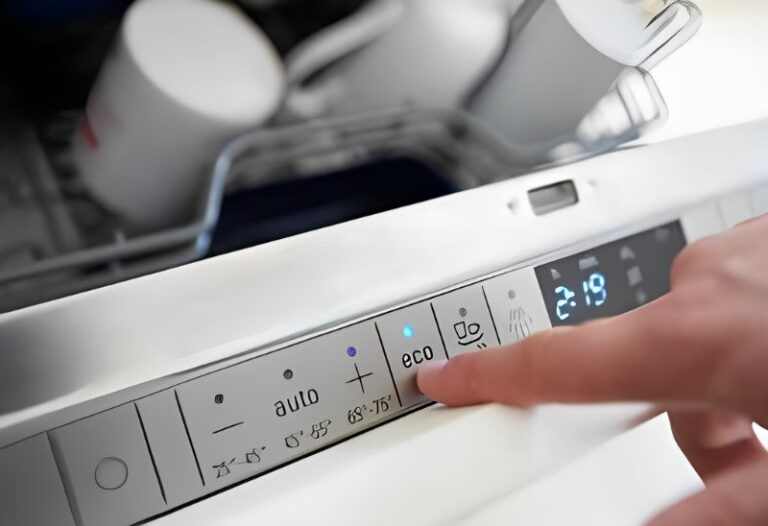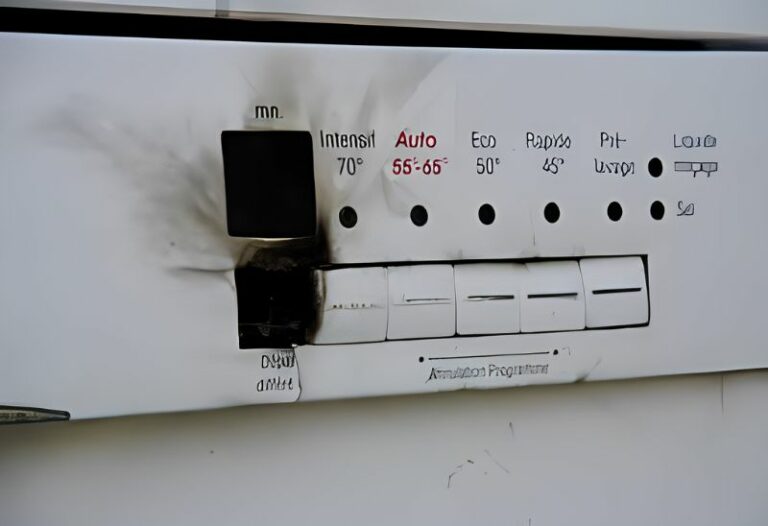Did you know that dishwashers are champions of efficiency and can use as little as 3 gallons of water per load? This is in contrast to the up to 27 gallons that hand washing can use.
Energy Star-certified machines can ramp up this efficiency even further.
By understanding how dishwashers work to use less water and energy and how your habits can influence this, you can tap into their water-saving potential.
Key Takeaways
- Dishwashers can be more water-efficient than hand washing, using as low as 3 gallons per load.
- Energy Star-certified dishwashers enhance water and energy savings.
- User habits play a significant role in maximizing dishwasher efficiency.

Water Use: Hand Washing vs. Dishwashers
Let’s get right to the point. You might be surprised to learn about the dramatic difference in water usage between modern dishwashers and traditional hand washing. Are you being as water-wise as you think?
Dishwasher Water Consumption: A Comparative Analysis
How much water does your dishwasher really use? Well, sit tight because you’re in for some enlightening facts. On average, an Energy Star-certified dishwasher can use as little as 3 gallons per load.
That’s right, just three! Modern dishwashers have ramped up their game with efficient models designed to minimize water wastage. They’ve turned high efficiency into an art form with sensors that tailor water and energy usage to the dirt level of your dishes. Isn’t technology marvellous?
Hand Washing Water Consumption: How Much Water Do You Use?
Now, let’s turn the tap to hand washing. Ever wonder how many gallons flow through your faucet while scrubbing pots and pans at the sink? Think about it. If you leave the water running, you could be using up to 27 gallons per session.
I know that number is a real heart-stopper! But even if you’re conservative and fill the sink instead, it’s a struggle to beat the efficiency of that trusty dishwasher sitting quietly in your kitchen.
Dishwasher Water Usage: How Much Water Does It Save?
Prepare to be wowed by this number. By choosing a dishwasher over hand washing, you could be saving up to 5,000 gallons of water annually. Imagine what you could do with all that water!
Dishwashers today aren’t just about sparkly cutlery; they’re about water conservation. With energy-efficient tech and water flow know-how, dishwashers are the unspoken heroes in the quest for water efficiency. Isn’t it comforting to know your dishes can be both impeccably clean and environmentally friendly?
Factors Contributing to Lower Water Usage in Dishwashers
Hey there! Did you know that your dishwasher is a water conservation hero? Let’s explore how this clever appliance manages to save every precious drop.
Efficient Water Spray Systems
Modern dishwashers come equipped with targeted water spray systems. These efficient models boast jets and nozzles designed to cover every corner, meaning no water is wasted. You’ll be surprised to find out that this small change can lead to big savings on your water bill.
Sensor Technology
Ever wonder if your dishwasher is water-wise? With sensor technology, it sure is! Soil sensors automatically adjust the water needed, tailoring each wash to the exact level of dirtiness of your dishes.
Leak-Proof Seals and Insulation
Nothing’s worse than a leaky appliance! Fortunately, your dishwasher comes with leak-proof seals and robust insulation that keeps water exactly where it should be—inside the machine. This not only saves water but also prevents any unwelcome kitchen puddles.
Multiple Filtration Cycles
Get this: your dishwasher recycles water. Through multiple filtration cycles, water is cleaned and reused within the same wash cycle, slashing the total amount of water used. Who knew that being eco-friendly could be so simple?
With these smart features, your dishwasher is doing its part for the planet. Just load it up and let it work its water-saving magic!
Tips for Reducing Energy and Water Consumption
Making a few small changes in how you use your dishwasher can lead to significant savings on your water and energy bills, not to mention a positive impact on the environment. Let’s dive into some specific, doable steps you can take right now.
Skip Pre-Washing Your Dishes
Think about the water you waste while pre-rinsing your dishes. Today’s dishwashers are designed to handle a bit of mess, so skip the rinse. By doing so, you could save up to 20 gallons of water per load. Plus, you’re cutting down on the time you spend at the sink—a win-win!
Opt for Full Dishwasher Loads
Running a half-empty dishwasher feels a bit like leaving the tap running, doesn’t it? Always wait for a full load before you start your dishwasher. This practice can not only save water but also reduce the frequency of cycles, lessening your energy consumption and lowering your bills over time.
Utilize Certified Appliances
If you’re in the market for a new dishwasher, look for one that’s ENERGY STAR-certified. These appliances are endorsed by the Environmental Protection Agency for their energy efficiency and reduced environmental impact.
An ENERGY STAR-certified dishwasher can save nearly 5,000 gallons of water over its lifetime.
Maintain Your Dishwasher
Your dishwasher can’t perform at its best if it’s not well-maintained. Check and clean the removable filter regularly—clogs can hinder water flow and efficiency. Ensuring that the spray arms are free from debris also promotes better cleaning performance and water conservation.
Remember, each small step adds up, making your kitchen routine more sustainable and friendly towards your wallet and the planet.
Minimizing Water Usage without a Dishwasher
Ready to slash that water bill and still keep your dishes sparkling? Let’s talk strategy.
Allow Dishes to Accumulate
Don’t rush to wash! Waiting until you have a full load of dishes maximizes water use efficiency. Just think, you’re saving water with every spoon that joins the party!
Use a Bucket for Washing
Instead of letting the tap run, fill a bucket or basin with soapy water. This simple swap can save gallons each time you tackle those dirty dishes.
Forego the Final Rinse
Who needs a final rinse? Wipe dishes after washing with a clean cloth. You’ll be surprised how much water this sneaky save can net you.
Reuse Water for Gardening
Take that soapy water and give it a new life in your garden. Reuse it to quench your plants’ thirst, turning a chore into a green act.
Conduct a Collective Dishwashing Session
Why not make it a group effort? Collect dishes from meals throughout your day and wash them in one go. This can lead to serious water savings and a little less time at the sink for you.
Select an Effective Dishwashing Detergent
Choose detergents that are tough on grease so you use less. A small amount of the right stuff can make a big difference in how much water is needed for those suds to work their magic.
Frequently Asked Questions
Let’s tackle some common curiosities about dishwashers and water saving, breaking down the facts into bite-sized answers.
Are dishwashers more water-efficient than hand washing?
Yes, quite a bit! A modern dishwasher uses about 3-4 gallons per cycle, while hand washing the same number of dishes can use up to 27 gallons.
Can operating a dishwasher reduce my utility bills?
It can indeed. By using less water, you’re also cutting down on the energy required to heat that water, which can lead to lower bills.
How does water usage differ between dishwashers and hand washing?
While a dishwasher might use 3-4 gallons per cycle, hand washing can easily consume more than six times that amount, so your water efficiency is drastically better with a dishwasher.
What’s the impact of a dishwasher on my electricity consumption?
Dishwashers do use electricity, but newer models are designed to be energy-efficient. The energy to heat water for hand washing comes out of scales that are used by your dishwasher.
Does the efficiency of a dishwasher justify its cost?
Considering the long-term savings on water and energy bills, plus the convenience, a dishwasher can pay off. It’s all about those future savings and sparkling dishes!
How much water can you save by using a dishwasher instead of hand washing?
You’re looking at saving roughly 23-24 gallons per load compared to hand washing. That adds up pretty quick! Just imagine what you could do with those savings.





